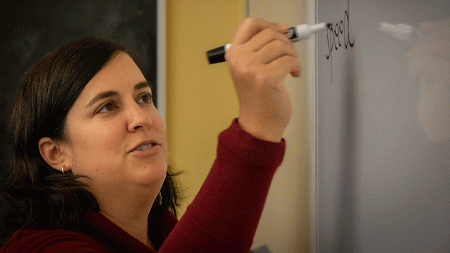Nicole Dudukovic recalls the time she was finishing her PhD in psychology and thought about pursuing a science communication master’s program, as well. As she built her expertise in the field of neuroscience, she wondered about how to translate her work beyond the scientific world to broader audiences.

That’s what she will do with her students when she begins teaching her winter term Calderwood Seminar in Public Writing, “Neuroscience Journalism.”
“I feel like it’s such a valuable skill for them to have, and I love being a part of that and seeing what they can produce,” says Dudukovic, a senior instructor of psychology and a core faculty member in the Clark Honors College.
This will mark Dudukovic’s third time teaching a Calderwood seminar. Two others will be offered during winter term – Professor Dare Baldwin’s “Public Science” course and Associate Professor Timothy William’s “The United States in the 1860s” seminar. There will also be two Calderwood seminars available spring term: Carol Paty’s “Chasing Planets” and Catalina de Onís’ “Translating Racial Ecologies.”
The seminars are small-group writing classes held in the Honors College that give students the chance to receive rapid feedback from their classmates and instructors that quickly improve writing and revision skills. The feedback, followed by broad discussion, helps make scientific jargon and other difficult subjects understandable for the average reader.
Calderwood seminars are open mainly to upperclassmen and occasionally sophomores in any major. The classes meet once a week for three hours in a workshop-style setting capped at 12 students.
As students write, they also take on the role of peer editor, providing thoughtful critiques on the work of others.
Dudukovic says she sees immediate benefits. “The thing that jumps out the most,” she says, “is just this experience that they don’t get in their other classes of getting detailed feedback in their writing.”
The small class sizes and close contact between teachers and peers makes the writing feedback provided in the seminars more curated and personal.
Williams says he sees the confidence in his students grow and that they learn to appreciate the importance of editing.
“Students in the past have commented that they’ve not only learned a lot about the American Civil War and Reconstruction, but they also learned how to write concisely and edit others’ work effectively,” he says.
Maya Ward, now a first-year student at the University of Oregon’s School of Law, remembers her initial reaction to getting feedback and edits from peers and teachers. “It was terrifying,” she recalls. Ward had taken a seminar called “Writing for Social Justice” with Acting Dean Carol Stabile.
Ward says she quickly settled in and saw the tremendous value of the seminar. “After the first assignment, I was excited to get (feedback) because I trusted the way that the Calderwood seminars are set up to foster extremely beneficial and not harsh criticism,” she says. “The seminar helped me refine my writing, which has really benefitted me in law school because everything has to be concise.”
Dudukovic says she sees the unique editing process as a mechanism that encourages students to write in a way that caters to a wider array of audiences.
“There’s this process of really trying to plan your writing, then take the feedback (to) revise it,” she says. She says honors college students find that Calderwood seminars “can be really useful for thesis writing.”
While Calderwood seminars may seem like they are catered toward specific majors and interests—whether they be neuroscience, history, or journalism—the skills learned within them are relevant for any career path.
Dudukovic says Calderwood seminars leave students “with a new perspective on their writing and an appreciation both for the need to revise and an appreciation for just what it means to communicate clearly and effectively.”
The Calderwood Seminars and their Descriptions:
WINTER 2023
Nicole Dudukovic: Neuroscience Journalism
In this course, students will grapple with the question of how to clearly and faithfully communicate about the intricacies of neuroscience in a way that is accessible to the public. For science majors, the challenge will be in eliminating technical jargon and overly complex prose; for non-science majors, the challenge might be in comprehending the original source material at a level that allows expression of some of the nuances of the research. Participants leave the course with a new perspective on neuroscience research and a heightened sense of self-efficacy as a writer.
Dare Baldwin: Public Science
Students will gain a window on forces driving the open science movement and explore its implications for human well-being. Writing assignments will engage open science issues within a variety of genres.
Timothy Williams: The United States in the 1860s
Students will read ground-breaking scholarship on the 1860s, as well as contemporary popular depictions of the 1860s in current literature and film. They will apply the critical thinking and writing skills acquired in the Clark Honors College and create over the term a portfolio of public writing about the decade.
SPRING 2023
Carol Paty: Chasing Planets
This course aims to develop an appreciation and deep understanding of the complex questions driving future space exploration missions and observation campaigns, and the physics behind the enabling technology through reading primary literature and watching seminars by the leaders in the field.
Catalina de Onís: Translating Racial Ecologies
This course focuses on communicating the importance of race, place, and space for audiences beyond the university. Class members will practice the role of being translators, who make their arguments, stories, and ideas accessible in public writing.
—By Julia Boboc, Clark Honors College Communications
—Photo by Alex Rodriguez, Clark Honors College Communications
